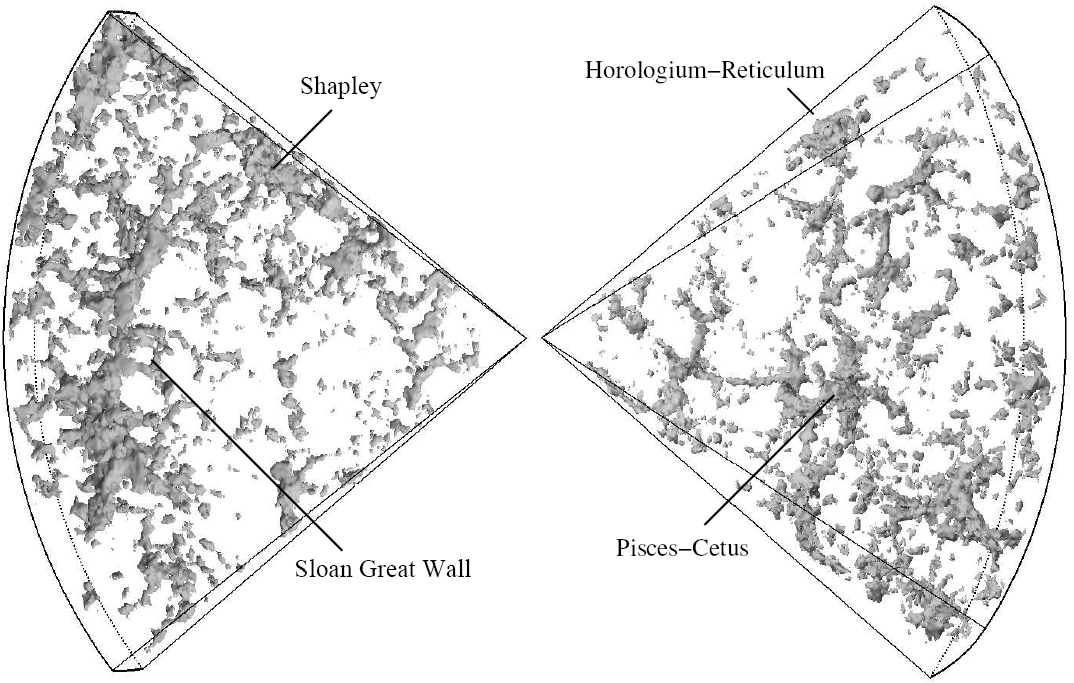Spiral galaxies
Spiral galaxies
Do all spiral galaxies spin the same direction? Is there any rule for this?
- Chris Peterson
- Abominable Snowman
- Posts: 18594
- Joined: Wed Jan 31, 2007 11:13 pm
- Location: Guffey, Colorado, USA
- Contact:
Re: Spiral galaxies
In most spiral galaxies the arms trail the rotation direction. But in a few they appear to lead. The actual direction a galaxy rotates is purely a function of our point of view, with about half going each way... it just depends whether we see them from the "top" or the "bottom" side (with those terms themselves being arbitrary).
Chris
*****************************************
Chris L Peterson
Cloudbait Observatory
https://www.cloudbait.com
*****************************************
Chris L Peterson
Cloudbait Observatory
https://www.cloudbait.com
- neufer
- Vacationer at Tralfamadore
- Posts: 18805
- Joined: Mon Jan 21, 2008 1:57 pm
- Location: Alexandria, Virginia
Re: Spiral galaxies
https://science.sciencemag.org/content/362/6420/1260.1 wrote:
Galaxy pairs follow filaments
Keith T. Smith
Science 14 Dec 2018:
Vol. 362, Issue 6420, pp. 1260-1261
DOI: 10.1126/science.362.6420.1260-a
<<Galaxies are nonuniformly distributed in the Universe, forming a cosmic web of filaments and clusters. Filaments occupy about 5% of the volume of the Universe but contain about a third of the galaxies, which grow by merging. Mesa et al. identified pairs of neighboring galaxies embedded within filaments. They found that the orientation of the pairs preferentially align with the axes of the surrounding filaments, with the effect being more pronounced for elliptical galaxies than for spirals. Because galaxy spins are known to follow the filament direction, this implies that major merger events have a preferred orientation in this environment.>>
https://en.wikipedia.org/wiki/Galaxy_filament wrote: <<In physical cosmology, galaxy filaments (subtypes: supercluster complexes, galaxy walls, and galaxy sheets) are the largest known structures in the universe. They are massive, thread-like formations, with a typical length of the order of 200 to 500 million light-years that form the boundaries between large voids in the universe. Filaments consist of gravitationally bound galaxies. Parts wherein many galaxies are very close to one another (in cosmic terms) are called superclusters. In the standard model of the evolution of the universe, galactic filaments form along and follow web-like strings of dark matter. It is thought that this dark matter dictates the structure of the Universe on the grandest of scales. Dark matter gravitationally attracts baryonic matter, and it is this "normal" matter that astronomers see forming long, thin walls of super-galactic clusters.>>
Art Neuendorffer
- orin stepanek
- Plutopian
- Posts: 8200
- Joined: Wed Jul 27, 2005 3:41 pm
- Location: Nebraska
Re: Spiral galaxies
This thread is not an APOD; Shouldn't it be in The Asterisk Café: (Discuss Anything Astronomy Related)!
Orin
Smile today; tomorrow's another day!
Smile today; tomorrow's another day!
Re: Spiral galaxies
You are correct, sir!orin stepanek wrote: ↑Thu Nov 21, 2019 3:39 am This thread is not an APOD; Shouldn't it be in The Asterisk Café: (Discuss Anything Astronomy Related)!
Know the quiet place within your heart and touch the rainbow of possibility; be
alive to the gentle breeze of communication, and please stop being such a jerk. — Garrison Keillor
alive to the gentle breeze of communication, and please stop being such a jerk. — Garrison Keillor
